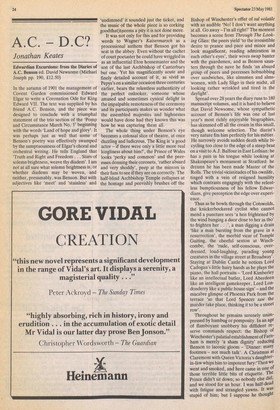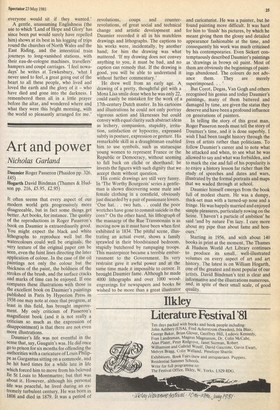A.C. D.C?
Jonathan Keates
Edwardian Excursions: from the Diaries of A.C. Benson ed. David Newsome (Michael Joseph pp. 190, £12.50) In the autumn of 1901 the management of Covent Garden commissioned Edward Elgar to write a Coronation Ode for King Edward VII. The text was supplied by his friend A.C. Benson, and the piece was designed to conclude with a triumphal statement of the trio section of the 'Pomp and Circumstance March No. 1' beginning with the words 'Land of hope and glory'. It was perhaps just as well that some of Benson's poetry was effectively swamped by the sumptuousness of Elgar's choral and orchestral writing. He tells England that 'Truth and Right and Freedom. . . Stars of solemn brightness, weave thy diadem'. I am not at all sure what solemn brightness is, or whether diadems may be woven, and neither, presumably, was Benson. But with adjectives like 'meet' and 'stainless' and 'undimmed' it sounded just the ticket, and the music of the whole piece is so corking goodithaf,ittseems a pity it is not done more.
It was not only for this and for providing words to Wagner's Kaisermarsch as a processional anthem that Benson got his seat in the abbey. Even without the cachet of court poetaster he could have wriggled in as an influential Eton housemaster and the son of the last Archbishop of Canterbury but one. Yet his magnificently acute and finely detailed account of it, as vivid as Pepys's on a similar occasion three centuries earlier, bears the relentless authenticity of the perfect onlooker, someone whose amused and sometimes cynical delight in the impalpable remoteness of the ceremony and its participants makes us wonder what the assembled majesties and highnesses would have done had they known this was how he was capturing them all.
The whole thing under Benson's eye becomes a colossal slice of theatre, at once dazzling and ludicrous. The King is 'a good actor — if there were only a little more real kingliness about him!', the Prince of Wales looks 'perky and common' and the peeresses donning their coronets, 'rather absurd and very shoddy', peep at the mirrors in their fans to see if they are on correctly. The half-blind Archbishop Temple collapses at the homage and peevishly brushes off the Bishop of Winchester's offer of sal volatile with an audible 'No! I don't want anything at all. Go away I'm all right!' The moment becomes a scene from Through The Looking Glass: the peers yield `to the irresistible desire to prance and pace and mince and look magnificent, reading admiration in each other's eyes', their wives swap banter with the guardsmen, and as Benson saun ters through the nave he finds 'an absurd group of peers and peeresses hobnobbing over sandwiches, like almsmen and almswomen, with Lady Sligo in their midst, all looking rather wrinkled and tired in the daylight'.
Spread over 28 years the diary runs to 180 manuscript volumes, and it is hard to believe that David Newsome, whose sympathetic account of Benson's life was one of last year's most richly enjoyable biographies, has skimmed off all the cream in this small, though welcome selection. The diarist's very nature fits him perfectly for his métier. He narrowly avoids sudden death while bicycling too close to the edge of a steep brae on a visit to Ai. Balfour in East Lothian: he has a pain in his tongue while looking at Shakespeare's monument at Stratford: he dreams he has been made Master of the Rolls. The trivial vicissitudes of his ownlife, tinged with a vein of resigned humility which contrasts engagingly with the relentless bumptiousness of his fellow Edwardians, give perception the edge over experience.
Thus as he bowls through the Cotswolds, the knickerbockered cyclist who cannot mend a puncture sees 'a hen frightened by the wind banging a door close to her as tho' to frighten her. .', a man digging a drain 'like a man bursting from the grave in a resurrection', the morbid vicar of Temple Guiting, the cheeful sexton at Winchcombe, the 'rude, self-conscious, overdressed, loud-laughing, parading young creatures in the village street at Broadway'. Staying at Dublin Castle he notices Lord Cadogan's little hairy hands as he plays the piano, the hall portraits — 'Lord Kimberley like an intellectual butler, Lord Aberdeen like an intelligent gamekeeper, Lord Londonderry like a public house sign' — and the macabre glimpse of Phoenix Park from the terrace 'so that Lord Spencer saw the murder take place, thinking it to be a street row'.
Throughout he remains serenely unimpressed by humbug or pomposity. In an age of flamboyant snobbery his diffident reserve commands respect: the Bishop of Winchester's palatial establishment of Faro` ham is merely 'a sham dignity' reducing Benson to laconic gloom — 'Dinner: many footmen — not much talk'. A Christmas at Claremont with Queen Victoria's daughterin-law whips him to impotent fury:Then we went and smoked, and here came in one of those terrible little bits of etiquette. The Prince didn't sit down; so nobody else did; and we stood for an hour. I was half-dead with fatigue and strangled yawns. It was stupid of him; but I suppose he thought everyone would sit if they wanted.'
A gentle, unassuming Englishness (the use to which 'Land of Hope and Glory' has since been put would surely have repelled him) shows at its best in his logging of trips round the churches of North Wales and the East Riding, and the interstitial train journeys to long-vanished stations, with their eau-de-cologne machines, travellers' hampers and coupe carriages. `I feel nowadays' he writes at Tewkesbury, 'what I never used to feel, a great going out of the heart to all these people, who lived and loved the earth and the glory of it — who have died and gone into the darkness. 1 remembered them all in a little prayer before the altar, and wondered where and what they were this bright morning, with the world so pleasantly arranged for me.'











































 Previous page
Previous page